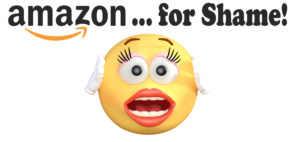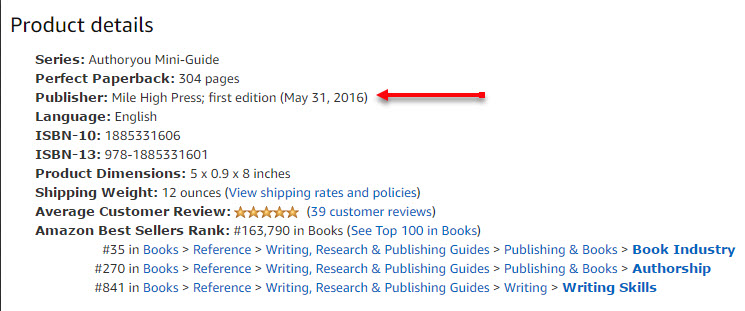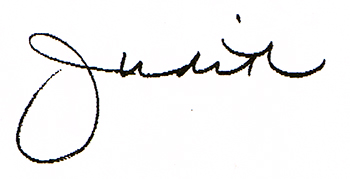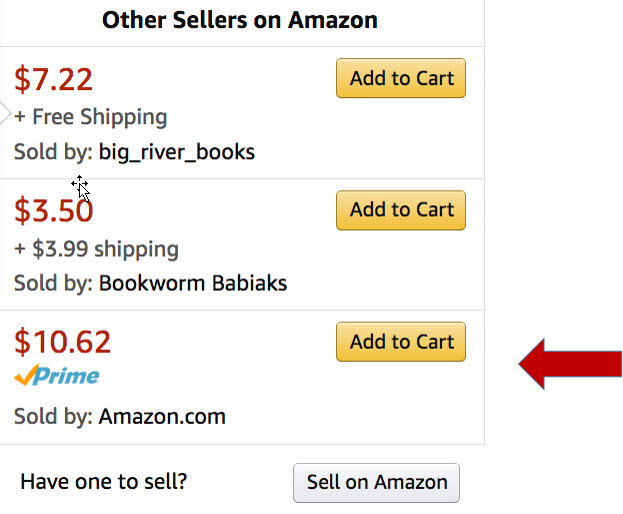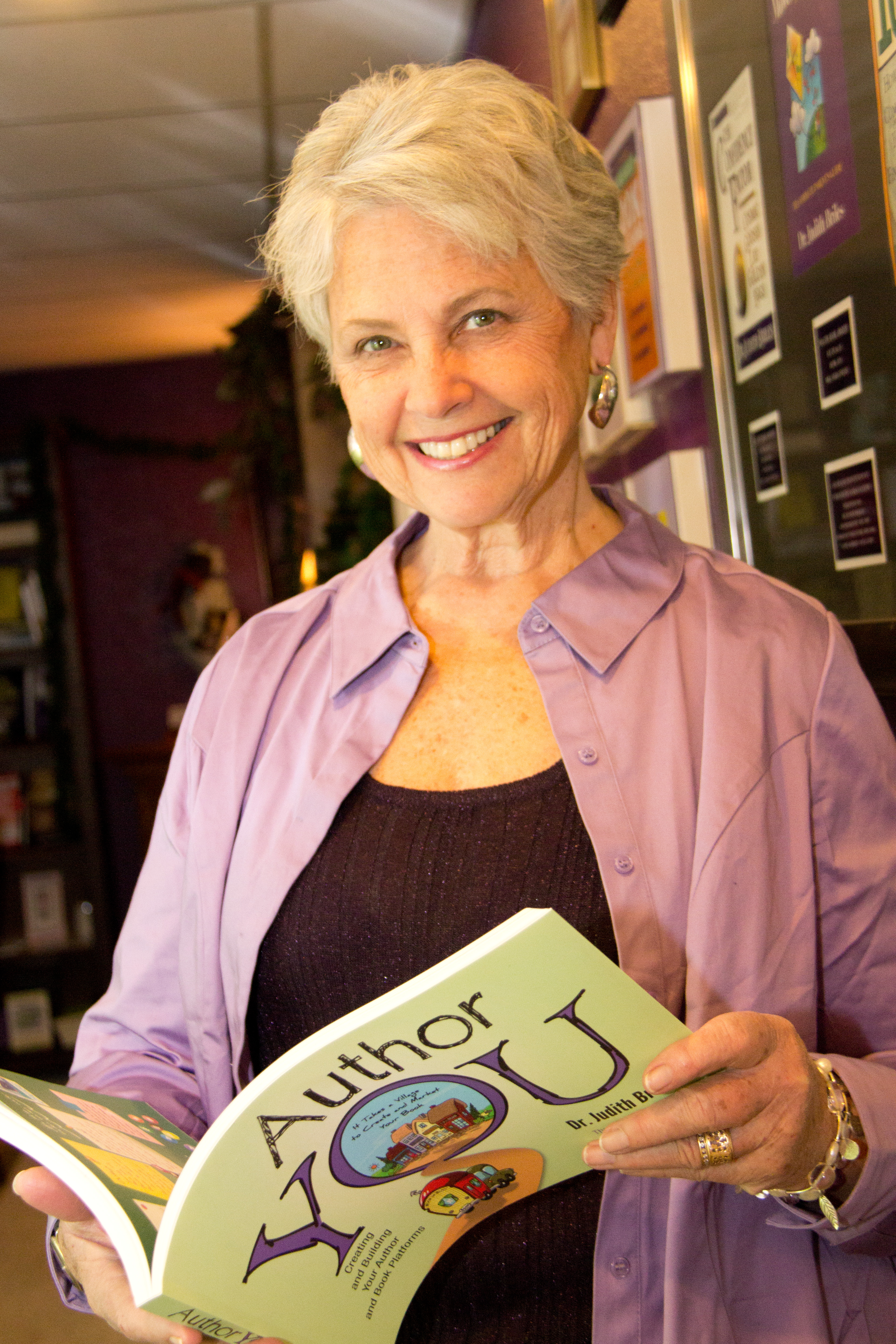DANGER, AUTHOR … DANGER, AUTHOR … DANGER, AUTHOR
Heads up authors … when you sell your book as the author/publisher, you may no longer be at the top of the list of buy choices!
Three of my clients have reported in writing that they have been “snagged” in the Amazon re-positioning of where to buy book from. What I’ve found is that it’s not on ALL book pages, but it’s growing. One went to buy three copies of a book as gifts–was ready to click BUY–and then noticed it wasn’t via the Amazon inventory that the author holds as a publisher, the first three BUY OPTIONS were all third party–and who knows where the books come from–reviewers who resell or someone who has the book from whatever source and is now letting it go via a resell–who knows.
As I kid, I remember watching “Lost in Space” on TV. Wil Robinson was sometimes warned by Robot B9 if he was going to do something dangerous or really dumb. I’m not sure if Amazon’s new posturing on the sale page is considered “dangerous”, but I’m confident it’s downright dumb.
Here’s what happened to Connie Pshigoda’s book, The Wise Woman’s Almanac, this week: 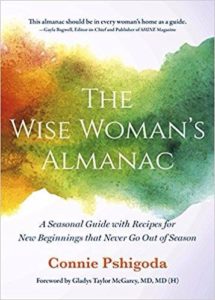
This is the new “buy” format from Amazon. Note that is from “big_river books” …as first choice. You may be thinking that Big Rivers is the publisher–nope… this is Connie Pshigoda’s book and her publisher is LenaClare Publishing. So Big River got her book from somewhere and is reselling it. Connie won’t get any money from the purchase. My opinion: it’s crappy … as in super crappy.
 Be on alert–and I would suggest that you let your Fans and Followers know how to buy if Amazon is the source–as in ONLY BUY from Amazon’s inventory–not a third party that is not directly related to the identified publisher on . Check your Book page several times a week to see what’s going on. Advise buyers if they are using Amazon to purchase to make sure that the publisher (found in Product Details below the description of the book) matches the name of the seller–if it does not, then assume the book has been pirated somehow. Here’s what mine for How to Avoid 101 Book Publishing Blunders, Bloopers & Boo-Boos looked liked on 5-16-2017 (note that my publishing company is Mile High Press):
Be on alert–and I would suggest that you let your Fans and Followers know how to buy if Amazon is the source–as in ONLY BUY from Amazon’s inventory–not a third party that is not directly related to the identified publisher on . Check your Book page several times a week to see what’s going on. Advise buyers if they are using Amazon to purchase to make sure that the publisher (found in Product Details below the description of the book) matches the name of the seller–if it does not, then assume the book has been pirated somehow. Here’s what mine for How to Avoid 101 Book Publishing Blunders, Bloopers & Boo-Boos looked liked on 5-16-2017 (note that my publishing company is Mile High Press):
Savvy authors will now do an alert to all potential buyers. Tell them to contact you directly to purchase a customized copy through your website if the publishing company (yours) isn’t displayed as the seller.
AND … ANY books that you send out for review or as a giveaway … create a sticker, marking or do a special POD printing for REVIEW ONLY … NOT FOR SALE …
I’m a member of the Independent Book Publishers Association (IBPA). Below is an announcement that popped last week that is directed from it … all authors that have books on Amazon for sale should take note.
If you are with IngramSpark, Create Space or any other POD service, this WILL most likely affect you! Amazon is pushing down your “buy button” to the bottom of “order the book” options list. Pay attention to your own sales over the next few months to determine if there is an impact. We will continue to follow and keep you informed of any changes.
Several authors have contacted me about the possibility of a “class action” type of suit. Maybe–I think this is something that organizations that have huge clouts (and resources), such as the Authors Guild based in New York comprised of major authors as individual members along with one book authors and many publishing companies, should be evaluating now. Amazon is the dominant bookseller in the United Sates with over 70% of books purchased online–it’s a 28 billion dollar industry last year alone.
Below is what IBPA shared with members last week (AuthorU.org–the organization I founded several years ago is an Affiliate of it):
Amazon’s “Buy Button” Policy Change Hurts Publishers and Authors
On March 1, Amazon enacted a policy change that allows third-party sellers to compete for the Buy Box for books in “new condition.”
In case you’re not visualizing the Buy Box in your mind, it is this:
And, here it is on the right side of the screen next to a book’s description:
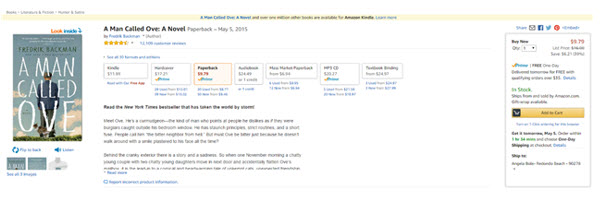 When you go to a product page on Amazon, the ADD TO CART Buy Box is the default offer. Other used options fall below the Buy Box. Where books are concerned, the default Buy Box has always belonged to the publisher. When you buy a book, Amazon pays the publisher 45% of the list price. This means your purchase is supporting the entity that published the book, namely the publisher, and authors are making a profit (albeit small) every time you buy because the publisher is paying an author royalty for each sale.
When you go to a product page on Amazon, the ADD TO CART Buy Box is the default offer. Other used options fall below the Buy Box. Where books are concerned, the default Buy Box has always belonged to the publisher. When you buy a book, Amazon pays the publisher 45% of the list price. This means your purchase is supporting the entity that published the book, namely the publisher, and authors are making a profit (albeit small) every time you buy because the publisher is paying an author royalty for each sale.
Now Amazon is giving that priority spot to third-party sellers, relegating the publisher button to a far less favorable position, below the landing page screen line, often last in a list of third-party sellers offering the book for a significantly lower cost in addition to free shipping. See the following example:
The Independent Book Publishers Association (IBPA) believes Amazon’s policy change, allowing third-party sellers to compete for the Buy Box for books in “new condition,” hurts authors and publishers. Here’s why:
• Amazon, once again, is attempting to drive down the value of books, and therefore intellectual property and creative work in general. Under the new policy, Amazon is rewarding the seller that conforms to its rules (“competitive pricing”) by granting them the coveted Buy Box. Often this means dropping the publisher listing, and it’s not unlikely that publisher listings may fall off the buy page completely—at Amazon’s discretion.
• When a book is not obviously for sale by its publisher on Amazon, the author may not be making royalties. Although for now, it seems that publisher listings are on Amazon, it takes a savvy consumer to even understand what they’re buying—and most will go for the lowest-cost item, especially if it’s in the coveted Buy Box position.
• While in some cases authors may still be making royalties off of third party sales, these sellers may also be obtaining books in ways that will not result in author compensation.
In all cases above, the books sold on Amazon would not qualify as sales for the purposes of author royalties because they’ve already been sold or originally existed as promotional copies. And even for those third-party sellers buying books through wholesale channels, the question arises of how Amazon is measuring “new condition.”
If consumers don’t see the option to buy new, from the publisher, then Amazon is promoting piracy. Authors get nothing from used books because the consumer is buying something that’s already been bought and tracked as a sale. If this new policy takes hold for most backlist books, authors’ and publishers’ revenue will dry up, and more and more books are at risk of going out of print more quickly. Publishers will not be able to afford to keep books in print that are not selling on Amazon. So, this policy is essentially driving books to an earlier death—and thereby hurting authors.
Amazon suggests that one of the ways you can win the Buy Box is to keep books “in stock.” This poses a major problem for self-published authors and any backlist author whose books are print-on-demand. Print-on-demand automatically means there’s no stock. The books are printed to order. If Amazon is penalizing books that are set up as POD titles and favoring third-party sellers who have stock due to any of the abovementioned means of procurement, authors will again be dinged when their own listing, or publisher listing, ranks low on the list of “Other Sellers on Amazon.” We can only suppose that Amazon will not penalize or remove books that are listed with CreateSpace—and as Amazon moves away from CreateSpace to consolidate its print and e-book self-publishing program onto Kindle, it will be interesting to note how often those books get the coveted Buy Box position for doing business with Amazon.
If indie publishers can’t get into bookstores and are being cut off at the knees by Amazon-induced piracy, then the future is grim indeed. As a community of indie publishers, we should be very bothered by this new policy. Amazon is a mammoth player in the publishing space and it can do much to either help or hurt the publishing industry. Their new third-party seller policy is potentially terrorizing, in that it is likely to result in publishers selling fewer copies and ultimately being forced to declare backlist books out of print.
IBPA will continue to research and monitor this situation and inform our members of any changes to the policy. In the meantime, we welcome reactions and additional scenarios in the comments section below.
Scenario 1
In April 2017, the publisher of SparkPress was emailed by an author who said her book was no longer being listed on Amazon—at all—as available from SparkPress. When one typed in the title of her book, the only listings that came up were from third-party sellers. Amazon’s policy states that “eligible sellers will be able to compete for the buy box,” but in this case, SparkPress had been completely wiped off Amazon as an eligible seller in any capacity, without being notified.
Scenario 2
Seal Press’s Second Wind by Cami Ostman experienced the same scenario. When you click on the product page for Second Wind, here’s what you see:
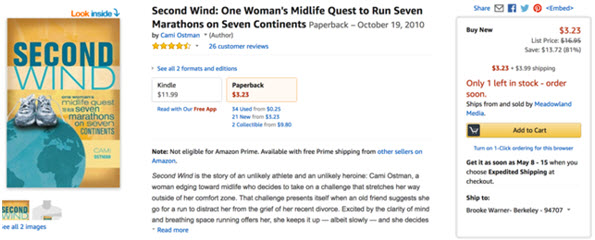 Note the paperback price: $3.23. Note the seller: Meadowland Media. At first glance, Seal Press’s listing could not be found, but it turned out to be there, just four buttons down and below the sight line of the landing page.
Note the paperback price: $3.23. Note the seller: Meadowland Media. At first glance, Seal Press’s listing could not be found, but it turned out to be there, just four buttons down and below the sight line of the landing page.
One must assume Meadowland is selling a used book as “new condition” in this scenario. Why? If they were purchasing the book wholesale they would have paid as much as 60% off the list price. So, they would have bought the book for $6.80. The only logical conclusion is that this seller is selling a used book, or a book they got for free in some capacity.
The impact this scenario could have on publishers’ backlist (typically meaning any book that’s six months or older) is devastating, especially because consumers don’t understand what’s going on here. When you search for this book, it looks as if the only listing that’s available is through Meadowland Media because the search function leads to a page where the only visibility you have is that Second Wind is $3.23. This screen shot says that there are “more buying options” but those buying options alert you to the 25-cent copy, not the copy being sold by the publisher for $10.62.
Small publishers are dependent on backlist sales for their livelihood. Amazon is a Herculean player when it comes to backlist sales because bookstores favor front-list books. If you’re looking for a book that’s a year old or more, you’re likely to go to Amazon to find it. Second Wind was published in 2010, but the way Amazon has set up this listing, it’s as if the book were out of print with the publisher. It’s not.
Judith Briles is a book publishing expert and coach. She empowers authors and is the Founder of AuthorU.org, a membership organization created for the serious author who wants to be seriously successful. She’s been writing about and conducting workshops on publishing since the ’80s. Judith is the author of 35 books including Author YOU: Creating and Building Your Author and Book Platforms (Foreword IndieFab Book of the Year), Snappy Sassy Salty: Wise Words for Authors and Writers and a speaker at publishing conferences. Book #35 was published in 2016: How to Avoid 101 Book Publishing Blunders, Bloopers & Boo-Boos. Get your copy now.
Each summer, she holds Judith Briles Book Publishing Unplugged, a three-day intensive limited to a small group of authors who want to be seriously successful. In 2017, the dates are June 22-24th. Her audio and workbook series, Creating Your Book and Author Platform is now available. Join Judith live on Thursdays at 6 p.m. EST for “AuthorU-Your Guide to Book Publishing” on the Toginet Network at bit.ly/PublishingShow.
Follow @AuthorU and @MyBookShepherd on Twitter and do a “Like” at AuthorU, and join the Facebook group Book Publishing with The Book Shepherd. If you want to create a book that has no regrets, contact Judith at Judith@Briles.com.
 Author U is a non-profit membership organization dedicated to the author who wants to be seriously successful. Monthly education programs delivered face-to-face and online, The Author Resource ezine, BookCamps, and the annual Author U Extravaganza are tools designed for authors pre-, during and post-publishing of their books. Join AuthorU.org today.
Author U is a non-profit membership organization dedicated to the author who wants to be seriously successful. Monthly education programs delivered face-to-face and online, The Author Resource ezine, BookCamps, and the annual Author U Extravaganza are tools designed for authors pre-, during and post-publishing of their books. Join AuthorU.org today.
If you are looking for FREE author and book coaching … call in to Judith’s Author Monday Mornings at NOON Eastern each Monday if you are an AuthorU.org GOLD member.

